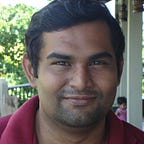Musings on Statistics — Stat Education
“What one fool can do another can” — Ancient Simian Proverb
The above is a saying I came across in one of the second hand books I purchased from a bookshop on Darley Road close to Saint Joseph’s College in Colombo. The title was “Calculus Made Easy” by Silvanus Thompson and I found it an interesting read during the days I was also learning about the first principles in Differentiation and Integration for my A/Ls in Mathematics. The book even though quite antiquated (it was published for schoolboys in the UK back in the early 1900s to learn Calculus if I understood the context correctly) was interesting to me because of the manner in which it attempted to make tough concepts easily accessible to people new to the topic and the author’s self-deprecating approach to teaching.
Coming back to the topic in hand which is Stat Education, one of the things which has struck me through out the period I have been and am still continuing to learn on the subject of Statistics is, how do you make a subject which to many people might be dull and uninteresting, worth their while to explore and spend time on understanding and also use in a practical sense in their everyday life ? This is a problem most educators face across different disciplines, probably.
I am gonna gloss over the Statistics covered in the Applied Math Paper in GCE A/Levels in Sri Lanka back during my time, because the Advance Level (A/L) was/is generally a competitive exam and most of the students at that point are usually looking at maximizing their marks for potential university entrance and devising a strategy on what choice of questions they are planning on answering at least back in my day. I “really” began to get an understanding about Statistics and Probability in my freshman year courses at University but even though I was not really very aware of how practically useful it could be, I was drawn in by the rigor needed to reason out the answer to questions and the mathematical bent of statistics, Math being my favorite subject.
Some of my key gripes with respect to Tertiary Education and Stat Education in particular that I had was the inability of not being able to relate the subject matter to something which could have a potentially useful application in real life or not being able to have a clear analogy for a key abstract concept in a clearly, articulated manner I could visualize. This was compounded by the fact that I was a slow learner and I found it frustrating when I could not ‘frame’ a concept in my head. I eventually began to accept this towards my second year and at certain point I started learning for the sake of learning but not for the sake of learning for the sake of application. I feel sadly this might be more common than expected for a large number of students following natural sciences at least.
I was fortunate enough to be selected to major in Statistics in my third year and this was the ‘tipping point’ in a sense for me. I started to indulge myself by reading up on how the theory I learnt had practical applications from books, magazines and blogs and it fascinated me. I was amazed to know that Google’s PageRank Algorithm was modeled on a Markov Chain, a topic I would learn in my 4th year at University. So even though I did not fully understand some concepts reading up on the uses made me feel I could use them some day.
Over the years with my grasp on the subject getting (slightly) better I feel the subject matter could have been organized better in the way the concepts tie in. For example you start of learning the axioms of probability, and concepts like random variables, expected values and probability distributions etc, but sometimes you don’t get to see continuity in terms of what you learnt being used later and its left to you to fill in the blanks. For example if I was told that linear regression was simply a way of predicting E(Y|X) where Y was the dependent variable and X were the independent variables with a set of assumptions about the parametric distributions of X and this was related to the concept of random variables I would have a clearer understanding of how the maths tied in together. If I was also told as a fun fact that regression was used from back in the day of Gauss to predict the orbits of celestial bodies it would have added some context to its application for example. Of course there are different ways of teaching the same concept but I guess the emphasis I would like to strike is that rather than focusing on the computational aspect of problems it would be better to base Advanced Topics in Statistics on the first principles so that the structure is clear for the learner along with clearly defined practical outcomes with respect to applications. The computational aspect is necessary from a problem solving vantage point but the comprehension of the concepts is derived from the linking to first principles. At least that’s my two cents take on it and what works for me!
